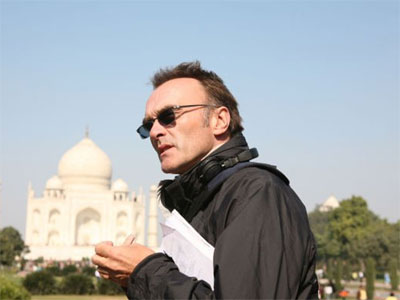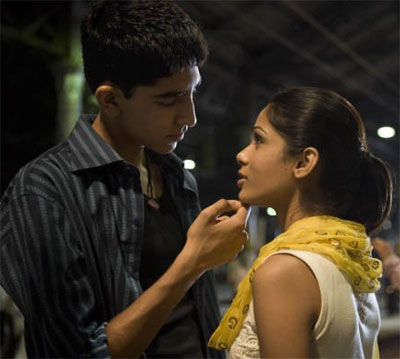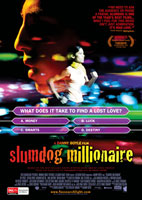Danny Boyle Slumdog Millionaire Interview

A VERY DISTINCTIVE DANNY BOYLE
EXCLUSIVE Danny Boyle, Slumdog Millionaire Interview by Paul Fischer.British director Danny Boyle has made films that one can hardly define as unoriginal, from the seminal Trainspotting to A Life Less Ordinary, 28 Days Later and Millions. His latest film, Slumdog Millionaire, could be hios richest and most enduring films to date. Set and shot in India, the films tells of Jamal Malik (Dev Patel), an 18 year-old orphan from the slums of Mumbai, who is about to experience the biggest day of his life. With the whole nation watching, he is just one question away from winning a staggering 20 million rupees on India's "Who Wants To Be A Millionaire?" But when the show breaks for the night, police arrest him on suspicion of cheating; how could a street kid know so much? Desperate to prove his innocence, Jamal tells the story of his life in the slum where he and his brother grew up, of their adventures together on the road, of vicious encounters with local gangs, and of Latika (Freida Pinto), the girl he loved and lost. Each chapter of his story reveals the key to the answer to one of the game show's questions.
Each chapter of Jamal's increasingly layered story reveals where he learned the answers to the show's seemingly impossible quizzes. But one question remains a mystery: what is this young man with no apparent desire for riches really doing on the game show? When the new day dawns and Jamal returns to answer the final question, the Inspector and sixty million viewers are about to find out. Danny Boyle talked to Paul Fischer about the film, India and Bollywood in this exclusive interview.
QUESTION: Is it true that you turned this down, originally? That this was not the sort of film that -
DANNY BOYLE: I didn't turn it down, because the agents slightly lazily described it as a film about Who Wants to Be a Millionaire?, I thought, "There's no way I want to do a film about that." And the only reason I read it-because normally, when you do something like that, you tend not to read the material, you know? But I noticed - because the agent had mentioned it - I noticed that Simon Beaufoy had written it. And I knew him from The Full Monty. I didn't know him personally, but I knew the writing. You know, the work, The Full Monty. And I thought, "You know, I should read"-listen, this is the honest truth. I thought, "I should read it, or a bit of it, so at least I can reply sounding like I'd read it." And I started it. And I gotta tell you - like, ten, 15 pages in, I knew I was going to make the film.
QUESTION: Why?
DANNY BOYLE: Because there's a kind of vibrancy in it, that - it just kind of glitters off the page. And I'm city-obsessed. I'm a real city person, you know? And I just went mad for it. You could feel the city, plus it's got this narrative. Plus it usurps the show. It uses the show. It basically usurps it. Because the kid hijacks the show, basically. Nobody's written that. He basically just hijacks the show for his own ends. And he winds up with $20 million. He just uses it for whatever he needs of it, you know? Just because he's an underdog at the start, they don't realize that actually he's taken the show basically for a ride. I mean, actually, of course, the truth is, in modern entertainment, anything - you know, it's like, there's no such thing as bad publicity. The show would obviously benefit ultimately. Anyway. So, it had all that going for it. And also, you just can feel it when you read a script. I mean, you read some scripts, and they're really good. Technically they're excellent. They do everything they need to do, blah blah. But they never glitter. They never get really - they never vibrate for you. With this, it just did.
QUESTION: Tell me about how you felt about this piece culturally? And being non-Indian, being an outsider, if you will, did that enhance the way you treated this material?
DANNY BOYLE: Well, I didn't think about it enough, I'll tell you that, because if you really think about it a lot, you think, "That's probably not a very good idea, a white guy going in and making a film there." You know, because it's the time of year, it's the time of the century, where I think things are going to be done differently. And I'm not a big fan of the films that go and show white guys going around India. That kind of film. It's not really my kind of film. And I think culturally, that kind of film has lost its place, really. I think we want people's stories from their own countries, really. So in many ways, I think it's probably not a good idea. But I didn't think about it like that. I just thought, "Oh my God, I love this place." And when I got there, I loved it. You know, the sense of - just energy in the city, is just scary. And it just felt like New York in the '80s. It was like - I mean, it's nothing like New York, except it's completely the same as New York. It's just full of stories and potential and danger and beauty, all piled together. Completely - and it's Ireland, like New York. People don't realize that.
 QUESTION: What were the challenges for you to cast this? I mean, was it important for you to make sure you cast it as locally as possible?
QUESTION: What were the challenges for you to cast this? I mean, was it important for you to make sure you cast it as locally as possible?DANNY BOYLE: Yeah, I did. Apart from Dev, who plays the lead - that was a separate issue. Everybody else was cast out of Bollywood, really. And I was going to cast him out of Bollywood, but the guys that I were seeing just weren't right. And my producer said I should look at this guy who does Skins on the TV. And I watched the show, and he was very good. So I got him in and saw him a couple of times. And he had a kind of tenacity, really, which I really liked, you know? He was funny, and kind of nice guy, and looked quite vulnerable in many ways, but actually he was quite tenacious. And that's the right combination for the character.
QUESTION: I understand there was a co-directing credit on this, which I didn't quite understand. Now, was that because of the Bollywood aspects of the movie, that you wanted somebody?
DANNY BOYLE: Oh, no, no, no. No, she was the casting director, to begin with and I relied on her so much for local cultural reference points, and fact-checking, and kind of just - you know, mistake-making. She wasn't frightened to point out to me - because we've built up quite a relationship during the casting, which took a long time, obviously. Because - and the kids and stuff. So she wasn't frightened to tell me when I was wrong. And I need - you need to know that, really. Because sometimes you need to correct it, and sometimes you need to know you're wrong, and make - stay wrong, because the logic of the film is different from a kind of documentary, or whatever. So then I got her every day on the film. I started to use her every day on the film. Not just to translate with the kids, but also just to help me. You know, to check things. To make sure I wasn't making any big mistakes. And then - you know, she wants to be a director. And I think she probably can be, you know? I think she's got the chutzpah for it. And so then I sent her out on the second unit, because the second unit material that was coming back wasn't very good. So I sent her out to shoot the second unit. And she did a great job on that. So.
QUESTION: It doesn't seem to paint Who Wants to Be a Millionaire in a hugely positive light.
DANNY BOYLE: The show?
QUESTION: Yeah. I mean, in some ways. There are aspects of the show that - where there's a lot of - where it deals with, I suppose, manipulation. Can this be any game show, and do you think this is particularly pertinent to this particular style of game show?
DANNY BOYLE: Oh, I think it's a great choice for it, because it's obviously - it's virtually universal now. There's a version opening in Afghanistan next month, supposedly, unbelievably. So, I mean, it's kind of universal. I like it, because I think it's the ultimate game show, in a way. It's offering the ultimate prize. It's almost sending itself off, except it's not. You know? You know, dangling this huge prize in front of people. Certainly that's my experience of it. Because when it started in Britain, which is where it began, what it offered was beyond comparison with anything that had ever been offered on a show before. I think they have to get special permission from the licensing authority, because it was just obscene, what they were offering compared to other shows.
QUESTION: Was it difficult for you to get the rights to use the game show?
DANNY BOYLE: No, because the production company, Celador, that produced the film - they invented the show years ago. And they sold it, but they obviously kept the rights so if there was ever a film made about it, they would have the rights to use the logo, the music. You know, the stakes, and things like that. So I'd say it was relatively easy. I mean, you know, you couldn't associate that show with terrorism, or - you know, germ warfare, or whatever. But yeah, no. Ironically, that was one of the easiest things. It looks - prospectively, you'd think that'd be a nightmare. But it was actually okay, yeah.
QUESTION: Is the show symbolic? I mean, it seems that the show is a starting-off point for the social disparities that exist within India. Was it important for you to be as realistic as possible, in terms of the depiction of the poverty and the sex trade, and those other sort of harsher facets of the country?
DANNY BOYLE: Yeah. You can't shy away from that, because if you're going to try and paint a full picture of the city - you know, a lot of stuff goes on that's really tough to take, you know? So you've got to show that. And people are surprised at that, because obviously people are selling the movie as a feel-good movie. And they're surprised. It's got some stuff in it which you wouldn't definitely describe as feel-good. But that's the point about the film, really. Is that it's a full picture of his life, and how he got there, you know? And a kid like that would have seen a lot by then, you know? He's been through a lot. And what's wonderful about him, of course, is that unlike his brother, who - it has affected him. His brother has turned to violence and vengeance, really, after the death of his mother. This kid has the grace to kind of see beyond it, to overcome it. You know?
QUESTION: The ending of this movie is extraordinary, the whole tribute to Bollywood that closes the movie. How much fun was it for you to do that musical sequence at the end? And did it give you a whole different perspective of the Bollywood film industry?
DANNY BOYLE: Well, I didn't really think of it as a tribute. I mean, I thought of it like everything else in the film. I wanted to kind of represent the city, because the city - and, I mean, we did live there for about a year, on and off - you can't live there and not watch, really. It just doesn't make any sense. You've got to kind of represent it somehow. So, it all felt like a natural thing to me, that it had to be part of the film somehow. It would just belong to the film. I watched a lot of Bollywood film, but really, more to do with watching them for the acting and stuff, really. I mean, the musicals are everywhere, because it's on MTV. They've got all these disco channels, video channels. You know, it's over everything. It's everywhere at the moment. You don't even have to watch the films, because songs are extracted from the films and sold on MTV. And some of it's very, very sophisticated as well, now, so it was more trying to genuinely sum up the city, in a way. Or as many elements of the city to get into the film that we feel that felt important.
QUESTION: What do you hope American audiences will get out of seeing this movie? What do you want them to get out of seeing this movie?
DANNY BOYLE: Big hearts. I mean, it's weird. I never thought it would work here. I always thought it would work in Britain, because of our closer connection to India. I thought America, in a way, would be too far away. It's not quite as visible, the connection. You know? But actually, having played it here a bit, you can see it's got a big heart, the film. And that country has. You know, there's a kid with a dream, and he apparently is unsuitable for his position, but actually, his dream succeeds. He gets there. And he mobilizes the country around it, which feels like a pretty close connection to me.
QUESTION: Are you a bit of a dreamer yourself?
DANNY BOYLE: I am a bit, actually. I mean, I have that kind of cynical sense of humor that the Brits have, but there's a bit of a romantic side of me as well. I go for that. I mean, that's what attracted me to the story, apart from the city. But then you can't - you know, a film's not going to work just as a portrait of the city. It has to be - it has to have that narrative, that character, that human heart that you follow.
QUESTION: You've dabbled now in so many different genres. Is there a genre that you have a - you have a burning passion to work in?
DANNY BOYLE: Oh, I'd love to do an animated film.
QUESTION: Really?
DANNY BOYLE: Oh, yeah. I was working on one, and it's kind of falling apart.
QUESTION: What are you doing next, then, Danny?
DANNY BOYLE: I don't know, actually, because that's just fallen apart, so I haven't really got anything. I do tend, on the whole, to only ever do one thing at a time, as well. So it's probably the best thing that I don't do anything until I've done all this work on publicity, and presenting the show. Because we've got to open it in Europe and Australia, and - you know, Japan. And it's got to go everywhere, you know? It's got to do all the rounds and everything.

Slumdog Millionaire
Cast: Dev Patel, Freida Pinto, Madhur Mittal, Anil Kapoor, Irrfan KhanDirector: Danny Boyle
Genre Drama/Comedy
From award winning British filmmaker Danny Boyle (Trainspotting, 28 Days Later) and written by the Oscar nominated writer of The Full Monty. Based on the award winning book Q & A by Indian writer Vikas Swarup and winner of the 2008 Cadillac People's Choice Award at the Toronto Film Festival.
SLUMDOG MILLIONAIRE is the story of how impoverished Indian teen Jamal Malik (Patel) became a contestant on the Hindi version of "Who Wants to be A Millionaire?" - an endeavour made without prize money in mind, rather, an effort to prove his love for his friend Latika (Pinto), who is an ardent fan of the show.
www.iconmovies.com.au/slumdogmillionaire
Only at the movies December 18, 2008
MORE
- Viggo Mortensen The Road
- 24 Cast Reunion
- Aaron Eckhardt No Reservations
- Aaron Eckhart The Dark Knight
- Adam McKay Step Brothers Interview
- Alan Alda Diminished Capacity Interview
- Alan Alda Diminished Capacity Interview
- Alex Dimitriades
- Al Pacino Oceans 13
- Alan Rickman Snow Cake
- Alan Rickman Sweeney Todd
Copyright © 2001 - Female.com.au, a Trillion.com Company - All rights reserved. 6-8 East Concourse, Beaumaris, Vic 3193, Australia.



